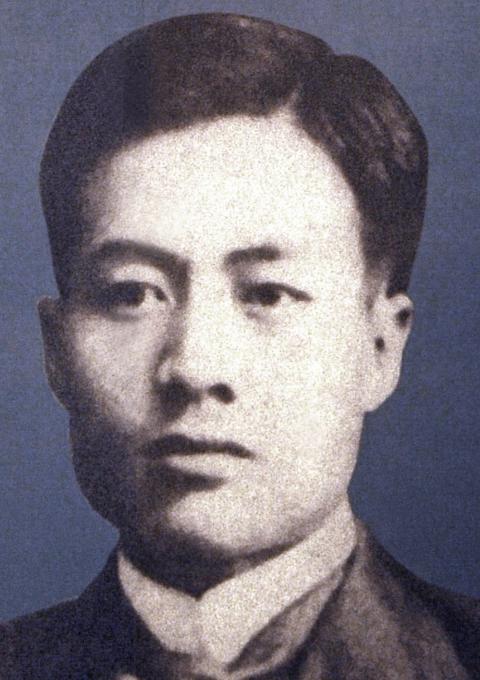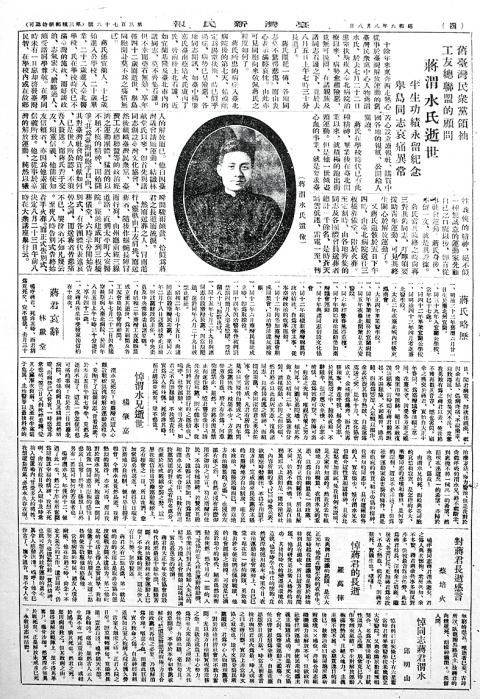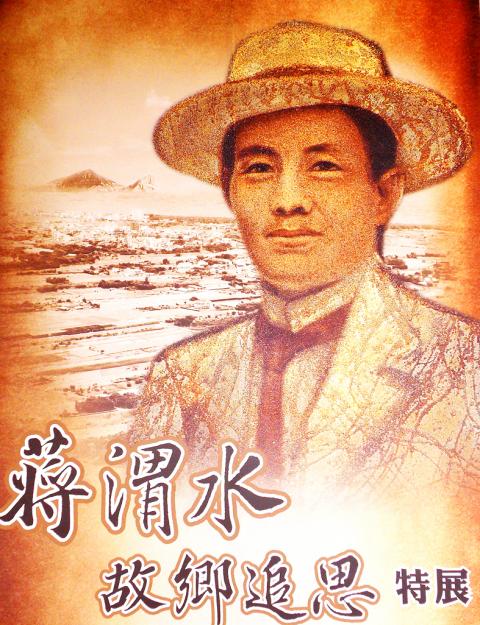On Aug. 5, 1931, Chiang Wei-shui (蔣渭水), an outspoken Taiwanese nationalist during the Japanese colonial era, passed away from typhoid after more than two weeks in the hospital. The man would later be considered a pioneer of Taiwanese democracy and one of the most important leaders of nonviolent resistance against Japanese rule.
The day before his untimely death at age 40, Chiang was still devoted to his cause, encouraging his comrades to “liberate our people.”
On Aug. 23, more than 2,000 people showed up at the funeral ceremony hall, despite warnings by the Japanese colonial government and a strong police presence. Next to Chiang’s photograph hung banners with phrases such as “your spirit will not die” and “liberation fighter.” The police examined and censored parts of the funeral speech, but let the ceremony go on. Right before the procession began, rain started to fall. The crowd, now numbering 5,000, followed Chiang’s hearse undeterred to his final resting place on Taipei’s Dazhi Mountain (大直山).

Taipei Times file photo
FREEDOM FIGHTER
Like many people and events before 1945, Chiang’s name has become mostly forgotten until recent decades. Today, he transcends Taiwan’s political divide, commanding the respect of both the Chinese Nationalist Party (KMT) and the Democratic Progressive Party (DPP).
Chiang, who is often dubbed the Sun Yat-sen of Taiwan (台灣的孫中山), was born in Yilan in 1891, four years before the Japanese took over Taiwan. It was during medical school that he became an outspoken nationalist activist. Armed rebellions against colonial rule mostly ceased after 1915, and intellectuals turned to other ways to fight for autonomy and self-determination.

Photo : Han cheung, Taipei Times
After five years of running his own hospital, Chiang participated in the first petition to the Japanese government for a Taiwanese representative assembly in 1921. Later that year, believing that Taiwanese were suffering from “cultural malnutrition” under Japanese rule, he founded the Taiwan Cultural Association (台灣文化協會) with Lin Hsien-tang (林獻堂), a founder of the Taiwan People’s Party (台灣民眾黨), and others. After convincing the authorities that they wouldn’t participate in political activities, the association held its first meeting with more than 1,000 attendees.
The association aimed to foster a sense of Taiwanese culture and nationalism through seminars, film screenings and other activities. Chiang often criticized the government through the Chinese-language Taiwan Minpao (台灣民報) newspaper, and the Japanese kept a close eye on his activities.
Chiang was arrested and sentenced to four months in jail in 1923, the first of nine subsequent imprisonments.

Taipei Times file photo
When the Cultural Association split into left and right wings in 1927, Chiang founded the Taiwan People’s Party after much government interference, the first legal political party ever in Taiwan. The party adopted Sun’s Three Principles of the People (三民主義) as its political philosophy. Chiang later became involved in worker’s and farmer’s rights.
During this time, his party presented to the League of Nations about the Japanese selling opium in Taiwan and shed light on the Wushe Incident (霧社事件) where more than 600 Aborigines were killed in an armed uprising against the Japanese.
In 1931, the government forcefully dissolved the party, and Chiang died soon after. Taiwanese democracy continued in 1934 when Koo Hsien-jung (辜顯榮) became the first Taiwanese to be named to the Japanese House of Peers. Local assemblies were established in 1935, but after Japan invaded China in 1937, all social movements were banned, and with it the beginning of the imperialist assimilation policy.
Chiang’s idealism is worth noting. He believed that unity in Asia would bring world peace. He wrote that since people in Taiwan were of Chinese descent (中華民族), yet citizens of Japan, they held the key to achieving good relations between the two countries.
OTHER EVENTS THIS WEEK IN HISTORY
The Wulai cable car, the first of its kind in Taiwan, saw its first passengers on Aug. 6, 1967. Each car could carry up to 18 people, and a round trip ticket cost NT$18 per person — not a small price for those days.
The Taipei Fine Arts Museum was established on Aug 8, 1983, on the former site of the United States Taiwan Defense Command headquarters. The command was abandoned in April 1979 following the annulment of the Sino-American Mutual Defense Treaty.
HOLIDAYS
Taiwan is the only country in the world to observe Father’s Day on Aug. 8. This practice originated in 1945 in China, as World War II drew to a close. The following year, prominent Shanghai citizens petitioned the government to make it an official observance to commemorate the fathers who died in the war. The KMT continued the tradition after its retreat to Taiwan, while the Chinese Communist Party adopted the international norm of the third Sunday in June.
Taiwan in Time, a new column about Taiwan’s history that is published every Sunday, spotlights important or interesting events around the nation that have anniversaries this week. Each edition features a main story with other noteworthy tidbits.

On April 26, The Lancet published a letter from two doctors at Taichung-based China Medical University Hospital (CMUH) warning that “Taiwan’s Health Care System is on the Brink of Collapse.” The authors said that “Years of policy inaction and mismanagement of resources have led to the National Health Insurance system operating under unsustainable conditions.” The pushback was immediate. Errors in the paper were quickly identified and publicized, to discredit the authors (the hospital apologized). CNA reported that CMUH said the letter described Taiwan in 2021 as having 62 nurses per 10,000 people, when the correct number was 78 nurses per 10,000

As we live longer, our risk of cognitive impairment is increasing. How can we delay the onset of symptoms? Do we have to give up every indulgence or can small changes make a difference? We asked neurologists for tips on how to keep our brains healthy for life. TAKE CARE OF YOUR HEALTH “All of the sensible things that apply to bodily health apply to brain health,” says Suzanne O’Sullivan, a consultant in neurology at the National Hospital for Neurology and Neurosurgery in London, and the author of The Age of Diagnosis. “When you’re 20, you can get away with absolute

May 5 to May 11 What started out as friction between Taiwanese students at Taichung First High School and a Japanese head cook escalated dramatically over the first two weeks of May 1927. It began on April 30 when the cook’s wife knew that lotus starch used in that night’s dinner had rat feces in it, but failed to inform staff until the meal was already prepared. The students believed that her silence was intentional, and filed a complaint. The school’s Japanese administrators sided with the cook’s family, dismissing the students as troublemakers and clamping down on their freedoms — with

As Donald Trump’s executive order in March led to the shuttering of Voice of America (VOA) — the global broadcaster whose roots date back to the fight against Nazi propaganda — he quickly attracted support from figures not used to aligning themselves with any US administration. Trump had ordered the US Agency for Global Media, the federal agency that funds VOA and other groups promoting independent journalism overseas, to be “eliminated to the maximum extent consistent with applicable law.” The decision suddenly halted programming in 49 languages to more than 425 million people. In Moscow, Margarita Simonyan, the hardline editor-in-chief of the